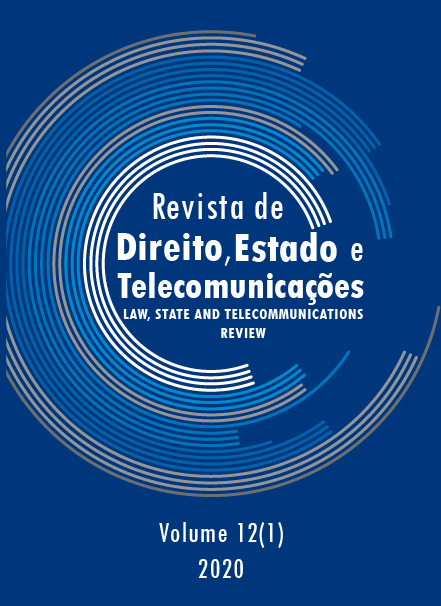Unfair Business Practices of the “Internet Giants” and the abusive de-indexing procedure of Google Adwords
An Analysis of French and EU Law
DOI:
https://doi.org/10.26512/lstr.v12i1.30008Keywords:
Competition Law ”“ France and European Union. Abuse of a Dominant Position. Abuse of Economic Dependence. Digital Platforms ”“ Google. Internet Giants. Internet RegulationAbstract
Objective ”“ The article explores the new unfair business practices of “Internet giants” with a focus on judicial and administrative precedents. Unfair commercial practices can happen in two ways: about consumers; and, concerning professional advertisers. The digital platforms ”“ especially Google Adwords ”“ have been under legal scrutiny by several courts and authorities, as the paper describes.
Methodology/approach/design ”“ The article has bibliographical and jurisprudential research on the unfair commercial practices of Internet giant companies, with emphasis on Google Adwords service. The selected cases come from the French courts and the Court of Justice of the European Union. After careful analysis, it is possible to determine lines of legal differentiation between the types of unfair commercial practices.
Findings ”“ The article concludes that the construction of a legal principle as duty of loyalty of digital platforms towards consumers and professional participants is an important advance. Thus, both European Union law and French law are in evolution, since they have foreseen this principle. However, for this principle to be effective, administrative and judicial action will be necessary. At the European Union level, this duty of loyalty must play a central role within the comprehensive set of public policies of the Digital Single Market.
Practical implications ”“ The article has practical implications, since it describes cases from France and the European Union, which are useful to understand both the Brazilian and the global situation. The commercial operations of Internet giant companies are transnational. Thus, it is useful to know how France and the European Union are labeling some certain commercial practices as unfair.
Originality/value ”“ There is no text in Portuguese that has carried out a survey of the French and European Union case law regarding unfair commercial practices of Internet giant companies. The text also helps to understand the joint application of French commercial and competition law in correlation with European Union law.
Downloads
References
BÉHAR-TOUCHAIS, Martine. “Être interopérable ou ne pas être: telle est la question!” (Ã propos de l'arrêt Microsoft du Tribunal de première instance des communautés européennes du 17 septembre 2007). Communication, Commerce Életronique, n. 3, mar. 2008.
BÉHAR-TOUCHAIS, Martine. De la difficile appréciation du délai raisonnable pour rompre une relation commerciale établie. Revue des contrats, n. 2, p. 431 et seq., abr. 2006.
BOULET, Laura; FROSSARD, Laureline. Chronique: un an de droit de la publicité. Communication, Commerce Électronique, n. 7-8, jul. 2014.
DEBET, Anne. Des limites posées aux publicités pour les boissons alcoolisées sur les réseaux sociaux. Communication, Commerce Électronique, n. 10, out. 2013.
FREGET, Olivier. Accès aux infrastructures essentielles et accès réglementé: la nécessité d’une mise à jour d’un concept ‘incontournable’? Revue Concurrences, n. 2, maio 2011.
FRISON-ROCHE, Marie-Anne. Réguler les entreprises cruciales. Recueil Dalloz, ano 190, n. 27 (7608), p. 1556-1563, 24 jul. 2014.
GRYNBAUM, Luc. Commentaire. Révue Lamy de droit de l’immatériel, p. 2971, 2013.
HENORET-MARCELLESI, Doris. Les infrastructures essentielles dans le secteur des nouvelles technologies. Gazzette du Palais, n. 202, 21 jul. 2005, p. 32 et seq.
LOISEAU, Grégoire. La publicité, même gratuite, est une publicité qui doit pouvoir être clairement identifiée comme telle. Communication, Commerce Électronique, n. 5, maio 2013.
LOISEAU, Grégoire. Quand les lois de la consommation servent aussi celles de la concurrence. Communication, Commerce Électronique, n. 2, fev. 2013.
MALLET-PUJOL, Nathalie. Internet e o direito ao esquecimento digital. Revista Ibero-Americana de Ciência da Informação, 12(1), p. 145-170, 2018. Disponível: https://doi.org/10.26512/rici.v12.n1.2019.12649. Acesso: 17 set. 2019.
MANARA, Cédric. Publicité sur internet: promotion par voie de référencement prioritaire d’offres. Récueil Dalloz, ano 188, n. 44 (7537), p. 2956-2960, 27 dez. 2012.
MARTIAL-BRAZ, Nathalie (ed.); ZOLINSKI, Célia (ed.). La gratuité, un concept aux frontières de l’Economie et du droit. Paris: LGDJ, 2013.
TRANS EUROPE EXPERTS. Réglementation de l’activité des plateformes en ligne et sort des données : les réponses du réseau d’experts européens en droit à la consultation publique de la Commission européenne relative à l’environnement réglementaire concernant les plateformes, les intermédiaires en ligne, les données et l’informatique en nuage ainsi que l’économie collaborative. Paris, 30 dez. 2015. Disponível: http://www.transeuropexperts.eu/documents/Synth%C3%A8se%20Plateforme%20TEE.pdf. Acesso: 8 out. 2019.
TRANS EUROPE EXPERTS. Réseau européen d’experts en droit ”“ European network of legal experts. Paris, 2015. Disponível: http://www.transeuropexperts.eu/. Acesso: 8 out. 2019.
ZOLYNSKI, Célia. Publicité en ligne et pratiques commerciales déloyales. In: BÉHAR-TOUCHAIS, Martine. L'efficacité du droit face à la puissance des géants de l'internet, v. 1. Paris: IRJS Editions 2015, p. 58-68.
Downloads
Published
How to Cite
Issue
Section
License
By submitting this paper to the Law, State and Telecommunications Review,
I hereby declare that I agree to the terms of the Creative Commons Attribution 4.0 International (CC BY 4.0).


